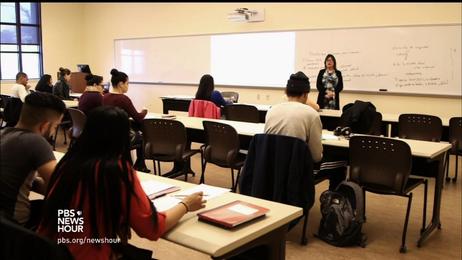New studies on incoming community college students found that as many as one-quarter of all students entering schools may be assigned to remedial courses they don’t really need. The studies, conducted by the Community College Research Center at Columbia University, discovered that although students are assigned to these remedial courses based on placement test scores, many would have been able to earn a “B” or better heading directly into college courses. The findings are significant because the large majority of students who take a remedial course in community college do not end up finishing their program and earning their degree.
About the Placement Tests
Many community colleges require incoming students to take placement exams before they can register for courses. The purpose of the examinations is to identify students who might need remedial help to ensure their success in college-level courses. The most common tests used by schools today are the ACT’s Compass or the College Board’s Accuplacer. Tests are designed to show academic deficiencies so students can be brought up to par before they are introduced to the rigors of a college curriculum.
However, the New York Times reports that while examinations have been used extensively since the 1980s, students often do not realize the importance of the scores they earn. Students are rarely encouraged to prepare for these examinations like they would for the ACT or SAT. Some students are told not to worry about the tests because they are simply used for placement.
This video discusses remedial courses at community college.
The Importance of Multiple Data
In many cases, community colleges rely on scores from these placement tests alone, rather than factoring in high school grade point averages and other data. Unfortunately, the test scores may not always provide as accurate a picture of a student’s academic ability as high school transcripts.
“It’s probably a mistake to rely on any single measure for high-stakes decisions,” Clive Belfield, an economics professor at Queens College, told the New York Times. “Where you have both a test and a high school transcript, the best thing is to use both together.
Researchers in the studies agreed. In a quote cited on CTI Career Search, researchers stated, “We find that placement tests do not yield strong predictions of how students will perform in college. In contrast, high school GPAs are useful for predicting many aspects of students’ college performance.”
This video explains how placement tests work.
The Washington Monthly quoted part of the studies’ findings, which stated: "Both studies find that students’ high school performance is a better predictor of which students could pass college classes. In one study, using high school GPA to place students was estimated to reduce the probability of both under- and over-placement by 50%. In the other study, the benefits of using GPA instead of test scores was smaller (with a predicted 10-15% reduction in severe placement errors); but using the best of either placement test scores or high school GPA was predicted to lower the remediation rate by 8 to 11 percentage points while simultaneously reducing placement errors and increasing college level success rates."
Researchers stopped short of recommending that community colleges do away with placement tests entirely, in favor of gauging student ability by GPA alone. Instead, research seems to indicate that a combination of exam scores and high school grades may be the best predictor of potential academic success.
The Problem with Remedial Education
Remedial education is problematic since the majority of students required to take these courses do not end up finishing their degree program. Remedial courses must be paid for like other college classes, but they do not offer credit that can be applied to graduation requirements. This delays a student’s time in college, and it makes the experience more expensive. The New York Times states that less than one-quarter of students who are placed in remedial programs earn two-year degrees or transfer to a four-year institution.
“We hear a lot about the high rates of failure in college-level classes at community colleges,” Judith Scott-Clayton, author of the study and professor at Teachers College, told the New York Times. “Those are very visible. What’s harder to see are the students who could have done well at the college level but never got the chance because of these placement tests.”
Community colleges vary in how they approach the process of remedial education. Yahoo News reports that some schools require students to enroll in remedial courses before they can register for any college-level classes. Others allow students to make the choice between remedial education and college classes, even if their test scores were not up to par.
In this video, two students discuss their path to remedial courses.
Remedial Education Reform
As President Obama is pushing community colleges to improve completion rates, remedial education is one of the factors being seriously examined at many schools. Some are finding ways to make remedial education easier, ensuring students spend time pursuing degree programs, rather than immersing themselves in high school math or English. For example, Northern Virginia Community College recently revamped its remedial math programs, so students can pinpoint the specific subjects they need refreshing, rather than taking a semester-long class.
Lake Area Technical Institute in South Dakota is also changing its approach to remedial education. Deb Shephard, president of the school, told the New York Times, “We get some students with rusty math skills who do poorly on the test, and we send them to a website where they can brush up their skills and take the test again, and most of them do fine. It’s less than five percent of our entering students who need remediation, and they do it on their lunch hour, side by side with the other courses they’re taking.”
Questions? Contact us on Facebook. @communitycollegereview















